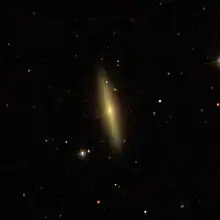| NGC 781 | |
|---|---|
 SDSS image of NGC 781 | |
| Observation data (J2000 epoch) | |
| Constellation | Aries |
| Right ascension | 02h 00m 08.97485s[1] |
| Declination | +12° 39′ 22.0060″[1] |
| Redshift | 0.011631[2] |
| Heliocentric radial velocity | 3467 km/s[2] |
| Distance | 154.2 ± 10.9 Mly (47.29 ± 3.34 Mpc)[3] |
| Apparent magnitude (B) | 14.00[2] |
| Characteristics | |
| Type | S?[3] |
| Other designations | |
| UGC 1482, MCG +02-06-010, PGC 7577[2] | |
NGC 781 is a spiral galaxy in the constellation Aries. It is estimated to be about 154 million light years from the Milky Way[3] and has a diameter of approximately 70,000 light years. NGC 781 was discovered on October 16, 1784 by the German-British astronomer William Herschel.[4][5]

NGC 781 (SDSS DR14)
See also
References
- 1 2 Brown, A. G. A.; et al. (Gaia collaboration) (August 2018). "Gaia Data Release 2: Summary of the contents and survey properties". Astronomy & Astrophysics. 616. A1. arXiv:1804.09365. Bibcode:2018A&A...616A...1G. doi:10.1051/0004-6361/201833051.
- 1 2 3 4 "NGC 781". SIMBAD. Centre de données astronomiques de Strasbourg. Retrieved 2020-05-24.
- 1 2 3 "Results for object NGC 0781 (NGC 781)". NASA/IPAC Extragalactic Database. California Institute of Technology. Retrieved 2020-05-24.
- ↑ Ford, Dominic. "The galaxy NGC 781 - In-The-Sky.org". in-the-sky.org. Retrieved 2020-03-24.
- ↑ "Revised NGC Data for NGC 781". spider.seds.org. Retrieved 2020-03-24.
External links
 Media related to NGC 781 at Wikimedia Commons
Media related to NGC 781 at Wikimedia Commons
This article is issued from Wikipedia. The text is licensed under Creative Commons - Attribution - Sharealike. Additional terms may apply for the media files.